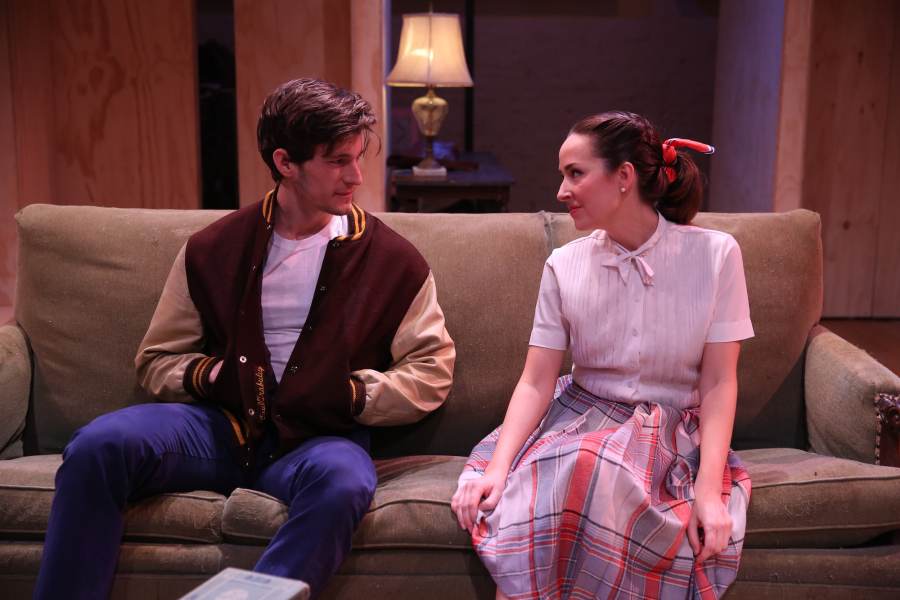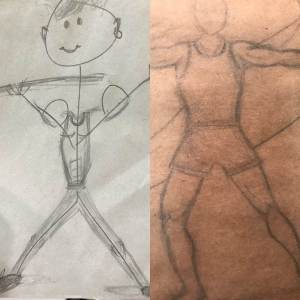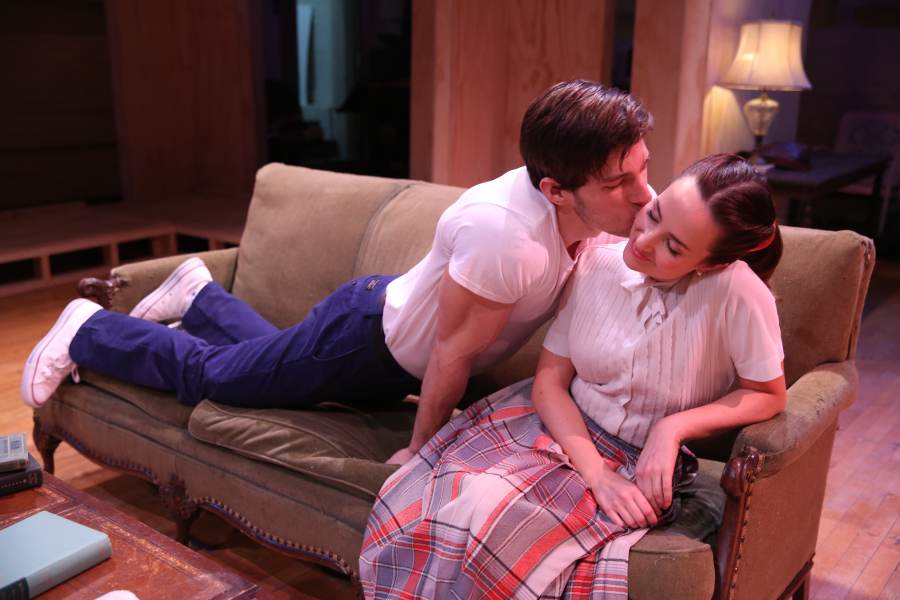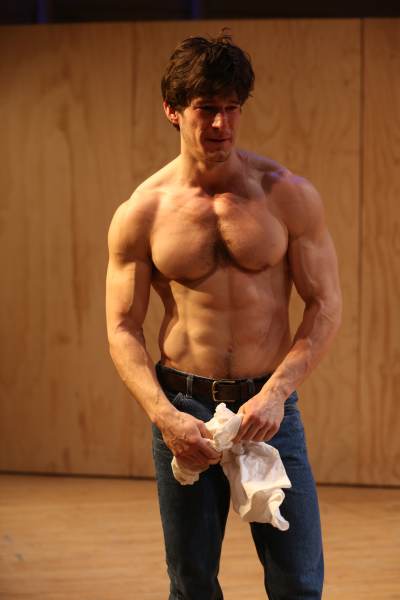

The Transport Group’s artistic director Jack Cummings III is revitalizing William Inge classics Picnic and Come Back, Little Sheba by having them performed in rep with an ensemble featuring beloved pros like Emily Skinner, Heather MacRae and John Cariani, and rising stars like David T. Patterson and Hannah Elless. In fact part of what makes the productions so special is the trust Cummings puts in the younger actors who oftentimes have to carry the heaviest emotional burdens of the plays. In Picnic, Patterson plays Hal, the drifter who arrives into town to accidentally tear down their conventions and hypocrisy, while Elless plays Millie, the shy tomboy who has a crush on Hal but knows a guy like that would only want to be with her sister Madge (Ginna LeVine). Conversely in Sheba we see Elless as the voracious Marie, who romances the dimwitted Turk (Patterson) while she waits to marry a respectable man.
In both plays Patterson and Elless exude the kind of chemistry that makes you want to cast them in everything together, as they make for an oddly lovable couple. Patterson subverts our notions of beefcake by turning in heart wrenching work, perhaps it’s because of his quarterback goodlooks and his imposing physique that watching Hal ache can’t help but break our hearts too, it’s like watching an oak being torn down. Similarly Elless is able to combine seduction with an intellectual quality that’s all too rare onstage; as Millie she lives inside her head, but as Marie she exposes all her cards, who needs to bluff when winning is a guarantee?
I spoke to the charming Patterson and Elless about their breakthrough roles, how being in two Inge plays affected their work in each show, and the possibility of working together in the future.
How did the characters you play in Picnic inform the characters you play in Sheba?
Hannah Elless: I think we’re doing it in rep precisely because of how they inform each other. Jack Cummings III was the first one to come up with the idea and when he presented us with the character track of Millie and Marie I was kind of surprised to be honest. I thought Marie would pair naturally with Madge from Picnic because they’re both so feminine. I was surprised and equally excited because, no offense to David or anyone in the cast, I think I have the best rep...
David T. Patterson: Totally!
Hannah Elless: ...I joke that is you see Millie and Marie in rep you’ll see me go from a 16 year old tomboyish girl who doesn’t know what to do with her emotions and sexuality, and you see her grow throughout Picnic and in Sheba Marie kinda picks off where Millie ended. By the end of Sheba she’s fully a woman so to speak, so it’s a really nice trajectory for an actor. There are also a lot of similarities, I get to sketch David in both shows.
David T. Patterson: And I get to pose in both shows which is great. I also didn’t have to learn any special skills, so that’s a plus.
Hannah Elless: It’s true. I have so many sketches of David T. Patterson I could very well start a gallery.

Hannah Elless: No, you can tell David! He’s just being sassy. The very first rehearsal I sketched Davis as literally a stick figure...
David T. Patterson: ...with balloons on his arms. You gotta respect the guns, so she gave me little circle balloon arms, which was a step in the right direction.
Hannah Elless: Over the process I’ve actually learned how to sketch more, so now all the works in my sketch pad are mine. If you see sketching onstage it’s all Hannah Elless.
David T. Patterson: And they’re so good now! She’s on the fucking ball, it’s pretty impressive.
David, what about your characters?
David T. Patterson: There are surface similarities between Hal and Turk, you have the hot, young guy, who is full of energy, but the most interesting to me as an actor is dealing with class, Hal dreams of becoming someone of a higher class, he comes from a broken home, he comes from a lower class, and you have Turk who has it all so he doesn’t have to try too hard. Hal needs to impress people and show himself to be what he wants to build for his life.
There was this moment in Picnic where you as Hal were giving your back to the audience and seemed to be performing for the other characters. Can you talk about doing this performance within the performance? It’s like poor Hal never catches a break.
David T. Patterson: A lot of Hal is how he says he doesn’t want to be seen as a bum, he’s desperate to prove himself and to be seen as somebody of worth. He’s not unaware of his physical attractiveness and he can use that to his advantage, but his biggest dream is to have an office job. He wants the stable life he’s never had, so what’s really cool about what Jack has set up with the set design for Picnic is that you have this row in which we see the whole town and Hal trying to perform for them. I think that makes it all the more tragic when that facade is torn down by Rosemary.
Did you guys go back and watch the movie versions or remembered specific moments from productions you’ve attended? Or were you more interested in relying only on the script to work with your characters?
Hannah Elless: I have seen Picnic several times and I did it in college too only I played Madge, so it was fun to go back and explore Millie cause I never thought I’d have the opportunity to play that role. Of course now my life goal is to play every female character in Picnic as I age and end with Mrs. Potts and then I’ll take my final bow and leave this Earth. I did not watch the movie versions, I wanted a fresh idea of who these girls were, in 1950 there was a stereotype of who these women were, Marie could be a two dimensional flirty girl, and Millie could be a two dimensional tomboy and leave it at that.
David T. Patterson: I agree, I did not play Madge in college, but I think the only thing I’ve watched of William Holden in the movie is the dance scene because we were trying to figure out what that scene would be like. I am not a dancer.
Hannah Elless: Don’t listen to him, he’s a great mover!
The playbill says you’ve done Guys and Dolls!
David T. Patterson: I have yeah. But I’m more of a park and barker, maybe I’ll shimmy a little bit. I have a surprising amount of musical theatre on my resume thanks to school and summer stock, and one of the first plays we studied in school was Picnic. I was exposed to it then, so getting the opportunity to do this is a blessing.

I loved seeing all the props on Sheba, and Hannah, since you’ve been inside a post-WWII world since Bright Star, what was the importance of vintage objects in helping you find the character?
Hannah Elless: Coming from Bright Star which was 1944 and then finding myself in 1950 with Picnic and Sheba is interesting.
David T. Patterson: Slowly decade by decade, Hannah’s making her way to the present.
Hannah Elless: I’m hoping my next job is in the 60s, fingers crossed! Going from Bright Star where I played the most faithful girl just waiting for the boy she loves and to play someone in Sheba who has two boys in her life, who she’s dating and seeing at the same time, is a shock for people who have only seen me in Bright Star. Marie in Sheba is very modern for 1950 and even for 2017, a lot of getting into character for me was watching movies from the 1950s to see how people walked and carried themselves. There’s a very specific rhythm to the dialogue Inge wrote, we see things like “remember we think you’re both a couple of peaches” and David says...
David T. Patterson: You’re a swell skirt.
Hannah Elless: You’re a swell skirt? We have these phrases that only fit in this time period and I try to honor the 1950s, we’re playing a style and not playing two kids from 2017, we really want you to step in the 1950s world with us.
David T. Patterson: You try to honor the text and make it feel natural. It’s hard to say “oh gee” without making it seem like you’re commenting on it, so we need to take ownership of that in a way that feels organic. “Gee” is dated and we don’t want it to be jarring to your ears.
Hannah Elless: Nobody says “I’ll kill you, you ornery bastard!”
David T. Patterson: I don’t think anyone said that in 1950 either, but we need to make it feel authentic and real.
Hannah, I like that you brought up Marie’s modern qualities because it’s strange to see female characters on any medium who are allowed to be horny and lustful. When sex happens to women in art it’s often meant to seem shameful, so how was it for you to play two women who are so aware of what they desire?
Hannah Elless: It’s been very exciting to work with Jack in developing these characters because one of the first things we discussed is how all of the characters in these plays are having a sexual burgeoning of some sort. Every character is sexually charged, in Picnic Hal comes into the world and in Sheba it’s Marie. You’re right, a lot of people have a hard time watching female characters have their cake and eat it too. You’d be surprised to hear how many people talk to me about that when I leave the stage door, and not in a good way. I’ve had a lot of women and men tell me they’re bothered a character like Marie could have existed and that they would exist today. It bothers people to see a female character be sexually active and take charge of their own destiny. Jack and I talked a lot about that, we always wanted it was clear in Sheba that Marie was making the choice, she needed to have responsibility for her choices. Millie was the same, when have you seen a Millie grow up sexually before you? I give huge props to Jack for letting me explore that, I hope people walk away from the shows talking about it and I hope young girls feel empowered by it.
For you David, Hal and Turk are characters who are objectified, which is something we usually see done to female characters. How has the experience been for you?
David T. Patterson: Hal is the catalyst for a lot of the things in the play because of his physical appearance and it’s been interesting because tapping into that has been eye opening. The challenge is to make sure Hal is not just a hunk of meat, I want to bring a sensibility to him because at his core he’s just a scared young guy trying to deal with his own sexuality. I wanted people to walk out and connect to him, rather than just look at a pack of abs and the guns.
Hannah Elless: But come on, twist my arm...
David T. Patterson: (Laughs) It’s not just for my own vanity though. I’m trying to pay justice to William Inge.
Hannah Elless: Let me tell you a story, I’m sketching David in Sheba the other night, and there’s this young girl in the audience, she must’ve been 10…
David T. Patterson: ...so young for Sheba!
Hannah Elless: ...and then we had women all the way up to maybe 80 years in the audience, and Marie is sketching Turk and I can hear giggling women throughout the whole theater! I thought it was so funny that we get to see every day what that does to women and men. The whole audience is affected in a very tangible way.

Hannah Elless: Our beautiful costume designer has made a shirt that they can rip and then they stitch it up after every show. Sometimes it gets ripped too much and they have to sew him up in between acts.
So now that I know David can sing, if you guys could do a musical together what would it be?
David T. Patterson: Carousel?
Hannah Elless: That would be amazing. I wouldn’t mind a revival of Carousel that would be thrilling. Although all the Rodgers and Hammerstein revivals are great, I’d love to give a spin to all those characters I grew up with. You grow up with these characters, you become a grown up yourself and something in you wants to embody those characters.
Carousel would still have you in the post-war era though.
David T. Patterson: Let’s do Hair to bring Hanna to the 70s.
She already has Godspell so we need the 60s first. I’m working on a Sondheim project so I’d like to know which of his musicals are in your bucket list.
Hannah Elless: I love A Little Night Music, I think it’s my favorite Sondheim, I’d love to play Anne because everyone sees her as very whiny and complainy, so I’d love to play her and see if I can spin that a little bit and play her more like a girl with wants, needs and desires. And come on, singing “Soon” that’s a dream...
David T. Patterson: I’d go with Bobby from Company, I didn’t like that musical at first but then I revisited it when a friend of mine did it and I was so taken with it. Maybe spending a couple of years in New York I kind of connect to that loneliness, I think Inge really taps into that American longing and loneliness. I’ll take Sweeney too.
Since you get to see Jack all the time maybe you can ask him to do Company next? I’d give my firstborn to hear Emily Skinner doing “Ladies Who Lunch”.
Hannah Elless: Yes, we need to make that happen David.
David T. Patterson: If we get Emily Skinner on board we’re halfway there.
For more information on Picnic and Come Back, Little Sheba click here.